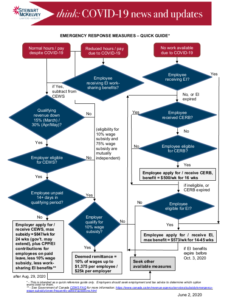Taking stock: Quick reference guide for government initiatives
*Flowchart below last updated June 2, 2020 (Originally published April 14, 2020)
With the passing of Bill C-14, the COVID-19 Emergency Response Act, No. 2 on April 11, 2020, the federal government has now laid a legislative foundation for various initiatives to assist employers and employees who are affected by COVID-19. The main measures include:
- The new Canada Emergency Response Benefit (“CERB”)
- The new Canada Emergency Wage Subsidy (“CEWS”), a 75% wage subsidy for eligible employers for the 12-week period beginning March 15, 2020
- The new 10% Temporary Wage Subsidy for employers
- Enhanced access to Employment Insurance (“EI”) benefits, including streamlining applications to the EI work-sharing program
Details on emergency response measures have shifted over the past few weeks, as they have evolved in response to our ever-changing situation. We expect this evolution will continue in many respects; notably, we are still awaiting regulations to further clarify some details related to CERB and CEWS.
However, given that the legislation now appears to be place, it seems an opportune moment for a fresh look at the current landscape of options. Recognizing it is a busy time, it is our pleasure to provide a dynamic summary of the mutual interactions between CERB, CEWS, EI and the 10% wage subsidy. We trust this will serve as a helpful reference point when seeking employment and tax advice to find the best options in the circumstances.
*Link to printable PDF version here.
This article is provided for general information only. If you have any questions about the above, please contact a member of our Labour and Employment group.
Click here to subscribe to Stewart McKelvey Thought Leadership articles and updates.
Archive
IN THIS ISSUE: Putting Trust in your Estate Planning, by Paul Coxworthy and Michael McGonnell The Risks, for Insurers in Entering Administration Services Only (ASO) Contracts, by Tyana Caplan Angels in Atlantic Canada, by Allison McCarthy, Gavin Stuttard and Adam Bata…
Read MoreBill 31, An Act Respecting Human Rights, came into force on June 24, 2010 replacing the Human Rights Code (the “Code”). For more information, please download a copy of this client update.
Read MoreIN THIS ISSUE Expanded Fines and Penalties for Environmental Offences: The New Federal Environmental Enforcement Act Spam about to be Canned? Preparing a Business for Sale Business Disputes Corner – Place of Arbitration and Selected…
Read MoreThe Nova Scotia Court of Appeal has unanimously upheld the province’s legislative limits on general damage recovery for “minor injuries”. Today’s decision, authored by Chief Justice Michael MacDonald, completely affirms the January 2009 decision of…
Read MoreThe Canada Revenue Agency (“CRA”) announced helpful administrative positions concerning the new rules under the Fifth Protocol to the Canada-US Income Tax Convention, 1980 which will come into effect on January 1, 2010. The CRA…
Read MoreIN THIS ISSUE Contractor Held Liable for Business Interruption: Heyes v. City of Vancouver, 2009 BCSC 651 When Can a Tendering Authority Walk Away if Bids are Too High? Crown Paving Ltd. v. Newfoundland &…
Read MoreWithholding tax and other issues under the Fifth Protocol The Fifth Protocol to the Canada-US Tax Convention, 1980 introduced significant changes which may affect the use of most unlimited companies and other so-called ULCs. These…
Read MoreIN THIS ISSUE An Eye for an Eye: Alberta Court of Appeal Upholds Finding of Retaliation Liability as a Result of Generosity in Quebec Undue Hardship Established in Scent Case Parents of Twins Get Double…
Read More- « Previous
- 1
- …
- 62
- 63
- 64

